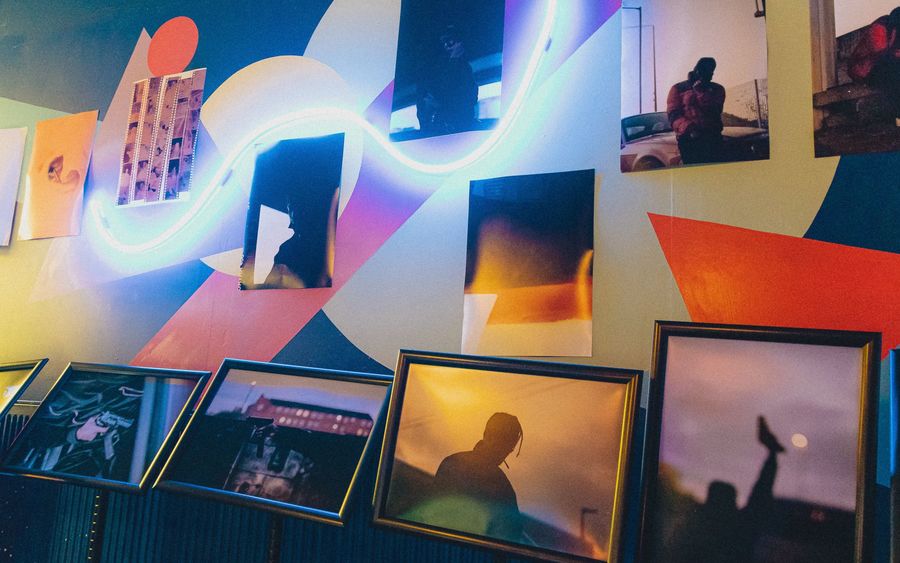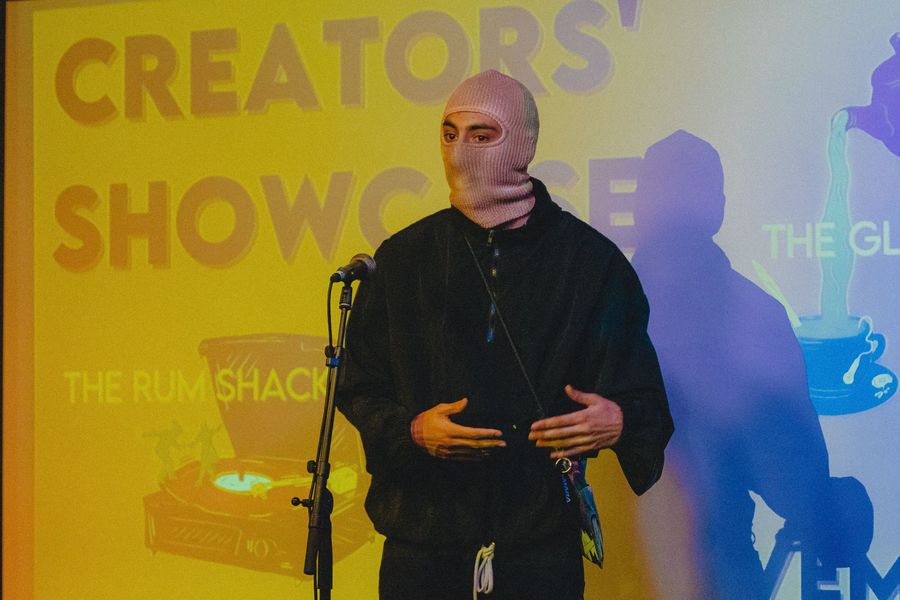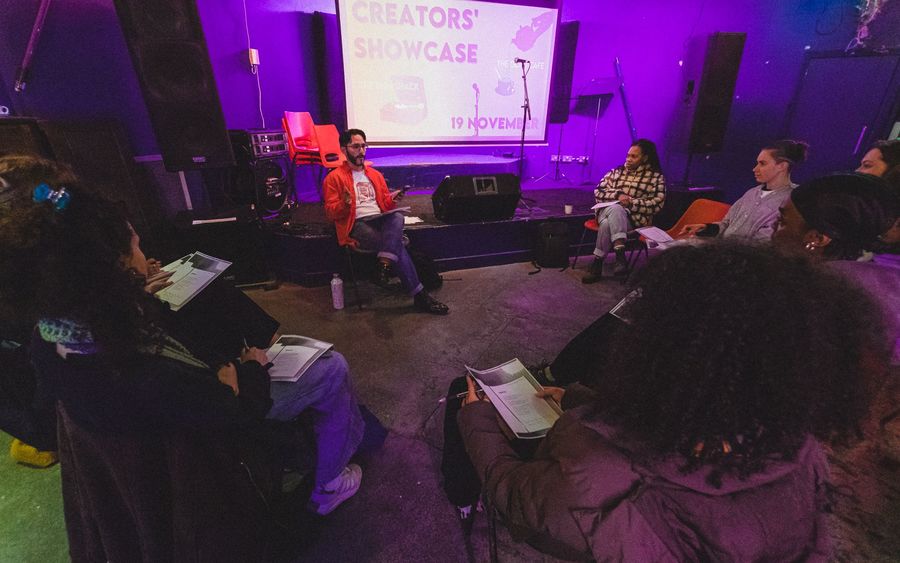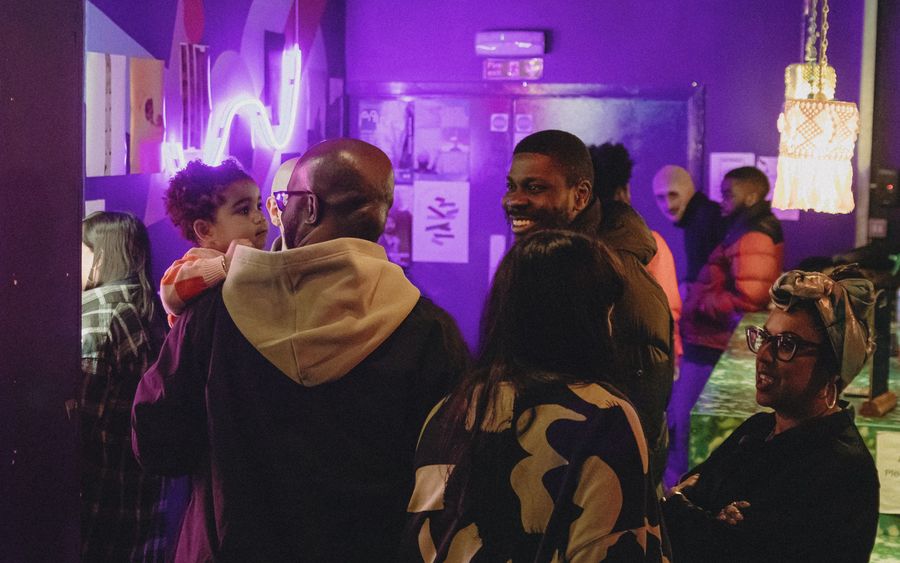Here & Now: We Are Here Scotland's Creators' Showcase
We reflect on We Are Here Scotland's vital and exciting Creators' Showcase in November featuring work by Zaim Ali, Sagnick Mukherjee, and Isabel Barfod
We Are Here Scotland (WAHS) was founded by creative practitioner Ica Headlam with the aim of amplifying the voices and experiences of Scotland-based BPoC (Black People and People of Colour) creatives. In 2021, WAHS launched its Creators’ Fund to provide BPoC creatives in Scotland with microgrants and mentoring from professionals in the creative industries. So far, two rounds of funding have taken place, seeing a total of 14 creatives each receive a £500 grant and mentoring from an industry professional. Following the success of rounds one and two, a third round will take place in early 2023 where another seven awardees will be selected.
In November, WAHS hosted a Creators’ Showcase in Glasgow, providing an opportunity for some of the awardees to display their work and take to the stage. The Creators’ Showcase was a two-part event: in the daytime, the Glad Café in Glasgow hosted an exhibition of the works of Isabel Barfod, Jinling Wu, Sagnick Mukherjee, and Zaim Ali. The evening event at the nearby Rum Shack was a night of music with live performances from Paque, ID, and Lamaya, as well as DJ sets from Hiba and Arusa Qureshi.
Upon arrival, the powerful photography of ‘conceptual artist and creative director’ Zaim Ali greeted attendees. Ali defines himself as more than a photographer or videographer – his work is ‘about trying to express a story and concept rather than technically good images or visuals’. With the £500 grant, Ali has produced part one of a five-part series, where he takes five of the music tracks that have influenced him most, and delivers images documenting what it can be like for young people of colour (PoC) living in Western societies.
Shot entirely on film, and inspired by the song If I Ruled the World by Nas and Lauryn Hill, the photographs follow a young Black man’s thought process as he decides whether to undertake a criminal act. The images question why young PoC feel boxed into this corner. To Ali, choosing criminal activity is often about wanting to have control over your life when, ‘in western society everything's built up against PoC so that they don’t have any control’.
Ali’s work isn’t about educating Western societies but about creating a platform for PoC, and this is something Ali feels his WAHS fund mentor, photographer Julian Bailey, understands. Ali is quick to credit his friends and family, saying his older sister is one of his ‘biggest supporters’ and encouraged him to apply for the Creators’ Fund. Ali also speaks of the mutual support amongst his closest friends because ‘we know there's no point stepping over others, especially each other, to get to where we want. We know that we're stronger as a unit supporting each other.'
Sagnick Mukherjee was the first artist to take the stage at the showcase. Mukherjee performed a short set of music for solo viola, memorably incorporating a low droning sound into one arrangement, offering a unique listening experience. Mukherjee began violin lessons age eleven, studying Indian and Bengali classical singing prior to that. As a teenager, Mukherjee would spend three or four hours playing everything from Beethoven to the Beatles to Bengali rock, as part of his school’s chamber orchestra. He says: "Even today, I get the most amount of satisfaction and fun from playing with other people. Playing chamber music is one of my favourite things to do."
Mukherjee’s proposal, as part of his Creators’ Fund application, was to create a modern edition of one of Joseph Bologne’s violin duets. Joseph Bologne was an 18th Century Black French composer who was one of the most famous and well-loved violinists and conductors in Paris at the time. Mukherjee explains that the first publicly available edition of the duets contains many inconsistencies and typographical errors, and that, ‘more people would be encouraged to play it if there was an accessible and reliable modern edition to play from’.
Tallah Brash, The Skinny’s very own music editor, is Mukherjee’s mentor; Mukherjee says she has ‘shown me how important it is to have a social media presence’. Brash’s mentorship has been invaluable to Mukherjee as he plans a performance evening where he’ll perform his edition of Bologne’s duet, with Brash ‘helping with marketing and finding a venue’. At the Creators’ Showcase, Mukherjee closed his performance by playing what he calls “noodles” – ideas he’s been contemplating and experimenting with. These “noodles” often originate from fragments composed on an ukulele he’s altered so that the strings are the same pitch as a viola. The different layout of a ukulele forces him to ‘come up with new and interesting patterns’.
Mukherjee’s “noodles” are perhaps an embodiment of the playfulness and excitement he has for classical music – something that is inviting to even those uninterested in the art form. He beautifully weaves together many strands of historic and modern composers, producing something distinct and filled with passion. He plans to have a collection of short viola pieces which draw from music he loves – classical, jazz, and ‘of course some Bengali music’.
Writer and filmmaker Jinling Wu was next to share her work. Wu read part of her play Nearly There, her most recent creative venture which has benefited from the £500 grant. The play follows Joe, a middle-aged accountant working for a self-serving boss. Joe has been secretly taking acting classes, but a turn of events sees his secret revealed, and the story begins to unfold. Nearly There carries many relatable themes, simultaneously commenting on the corporate workplace while delving into what it means to be an artist and the ways in which we define success. Wu worked first as a journalist in Shanghai, subsequently gaining a diploma in documentary directing from the Academy of Performing Arts in Prague, and a MA in fiction directing on the Kinoeyes European Movie Master programme between universities in Lisbon, Tallinn and Edinburgh.
For Wu, everything from the easy application process to the supportive environment facilitated by WAHS has made the Creators’ Fund a positive experience. In the past, Jinling has been asked by funding bodies to change how topics such as racism are displayed in her work. In contrast, Jinling feels her work has been embraced by WAHS, and that she’s had a lot of creative freedom. Her mentor, writer Heather Parry, has been another source of support: "Heather has been really generous in sharing her knowledge and provided very valuable feedback on my writing", Wu says. Wu’s excitement about Nearly There is contagious. She says writing has formed the “basis” of her creative practice in recent years because through becoming a “better writer, all aspects” of her work improve. Wu’s next goal is for Nearly There to be performed in theatres, something she’s committed to, despite knowing it will be a long process.
The Creators’ Showcase concluded with a screening of Sidesteps by animator and artist Isabel Barfod. Sidesteps is an animation about ‘the absurdity of taking up space in an environment that is constantly pushing our protagonist to the margins’. Barfod works across digital and hand-drawn 2D and 3D animation. Her work is ‘driven by irritation and speculation, looking to process agitations through drawing, scratching and mark making’. With her practice, Barfod 'seeks to draw out ''hard-to-describe'' micro-experiences, feelings and phenomena associated with moving in and out of private/public space as a Black queer person'.
Barfod’s artistic skill shines through in Sidesteps. None of her characters speak, but that in no way detracts from the storytelling. Instead, the characters speak in facial expressions and body language, which have been expertly animated by Barfod. Interlaced throughout the animation are soundbites from an interview Barfod conducted with a relative speaking on her experiences as a child in Jamaica, adding more textures to the animation.
Once Sidesteps finished there was a collective sense of amazement from the audience. Immediately, people turned to those beside them to discuss their interpretation of the animation. Every answer was different, but many of the film's themes deeply resonated with the audience, especially with its Black and PoC members.
A success from start to finish, it’s clear that We Are Here Scotland understand their assignment. Through this event, WAHS provided a space for some of Scotland’s most exciting up-and-coming talent to be held and celebrated – something so necessary for BPoC creatives in Scotland.
For more information on the Creators’ Fund, visit weareherescotland.com/news/creatorsfund
We Are Here Scotland are currently raising funds for round three of the Creators’ Fund via GoFundMe



